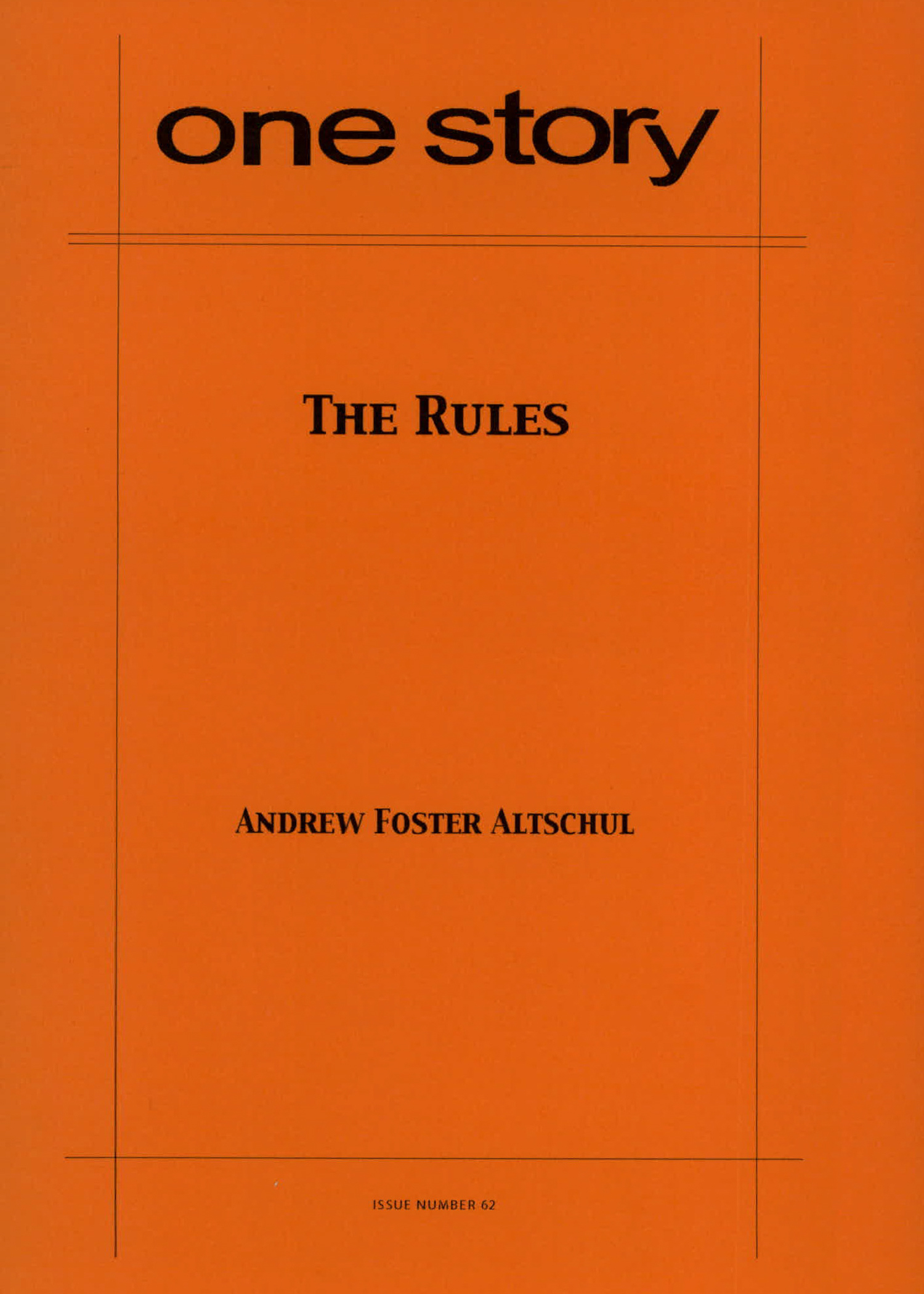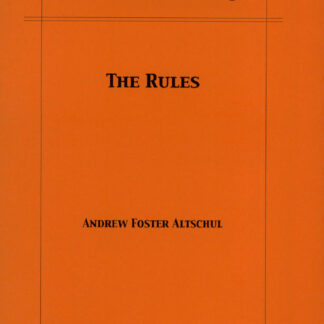
The Rules
$2.50
43 in stock
Excerpt
Nearly midnight, two figures walked arm in arm past Dolores Park, their shadows slipping in and out of the shadows of trees, thrown in quick silhouette by passing cars. Behind them, behind the dark hillside, a bruised sky loomed, lights atop the radio tower blinking faintly through the fog. At the corner, they stopped and embraced, holding to each other for warmth; their voices carried with surprising clarity, rising to the third-story window where Martin stood watching. One of the figures stepped into the street but jumped back at the wail of a startled driver’s horn. Martin saw them come together again, he heard laughter: Careful! He kept his back to the room, to the two at the cluttered table, the couch strewn with magazines, her guitar, the empty dog bed. He was cold, drowsy. It would be hours before they slept.
“Baby come back,” Jill said, her voice like strong hands kneading his shoulders. “We need you here. It’s showtime.”
“Baby come back,” crooned the Z-Man, and Jill giggled. “You can blame it all on me…Earth to Doctor Marty? Come in, Doctor Marty.”
Andrew Foster Altschul
Andrew Foster Altschul is the author of the new novel Lady Lazarus. A former alternative-rock DJ and music-magazine editor, his short fiction and essays have appeared in Esquire, McSweeney’s, Fence and other journals, online at The Huffington Post, and in anthologies including Best New American Voices and O. Henry Prize Stories. He lives in San Francisco and teaches at Stanford University.
Q&A by Hannah Tinti
- HT: Where did the idea for this story come from?
- AA: This story is actually a kind of sequel to a story I wrote years ago called “The One Life,” which takes place only about a month or so into Martin and Jill’s withdrawal from the world. About three years later, I suddenly realized I wasn’t done with these characters and sat down to take another crack at it, to see what had become of them. What’s interesting to me is that the earlier story is in a very fluid first-person, almost stream of consciousness, and when I started writing about their lives after a year of living like this, what immediately came out was this kind of hard-clipped, exhausted third-person voice. I didn’t even think about it.
- HT: How are ‘the rules’ of taking drugs and ‘the rules’ of the medical profession similar to Martin?
- AA: They’re similar because they’re meaningless.
- HT: The Z Man is such a memorable character. How did you create him? And why did you choose to put him in the scene with Jill and Martin, instead of having them be alone?
- AA: Z had a bit part in “The One Life.” He was just a name, never part of a scene. I knew I wanted him here because he has an important standpoint to stake out in the, uh, philosophical argument and he was a natural choice. But he didn’t come alive for me as a character until I found the red feather he wears as an earring.
- HT: Martin makes choices throughout this story: to be with his father when he dies, to leave medical school, to ‘drop out’ for a year, to take the drugs, and yet at the same time he seems powerless, as if he has no control over what happens. Did you intend this to be a psychological slide of some kind, or the influence of the drugs, or something else completely? Why does Martin make the choice to stick with this lifestyle, when he knows it will eventually kill the woman he loves?
- AA: That’s the thing, is I think for Martin, bizarrely, it’s about power—or “empowerment,” I suppose. This is what he’s doing, choosing his own self-destruction as a way of being able to really “choose” anything. If none of the rules we live by really have any validity, then it’s chaos, nothing is knowable, all plans and decisions and good works and karma in the end just amount to a dead kid on a gurney. So I think, in some way, this is his way of finding something over which he can have some control. But of course, that’s a pretty slippery proposition—and it’s getting away from him.
- HT: How long did it take you to complete this story?
- AA: I’m not sure I have, yet.
- HT: What is the best bit of advice about writing you have ever received?
- AA: Well, not so much about writing per se, but Wilton Barnhardt once told me that the most important thing for a writer is to have writer friends, to be surrounded by other people whose lives are dedicated to this strange enterprise. And I’ve really found that to be true; otherwise, you’re spending all your time doing something that few people really care much about and it gets disheartening unless you’re around people who understand it and value it. I’ve been extremely lucky in this regard to be able to claim some fantastic, smart writers as close friends.
- HT: What are you working on now?
- AA: I’m working on a big, messy, strange novel called Lady Lazarus. It’s about poetry, punk rock, and suicide. It’s the most exciting and challenging thing I’ve ever done, and it’s a lot of fun. But mentally and emotionally exhausting, of course. Makes me want to write microfiction.
